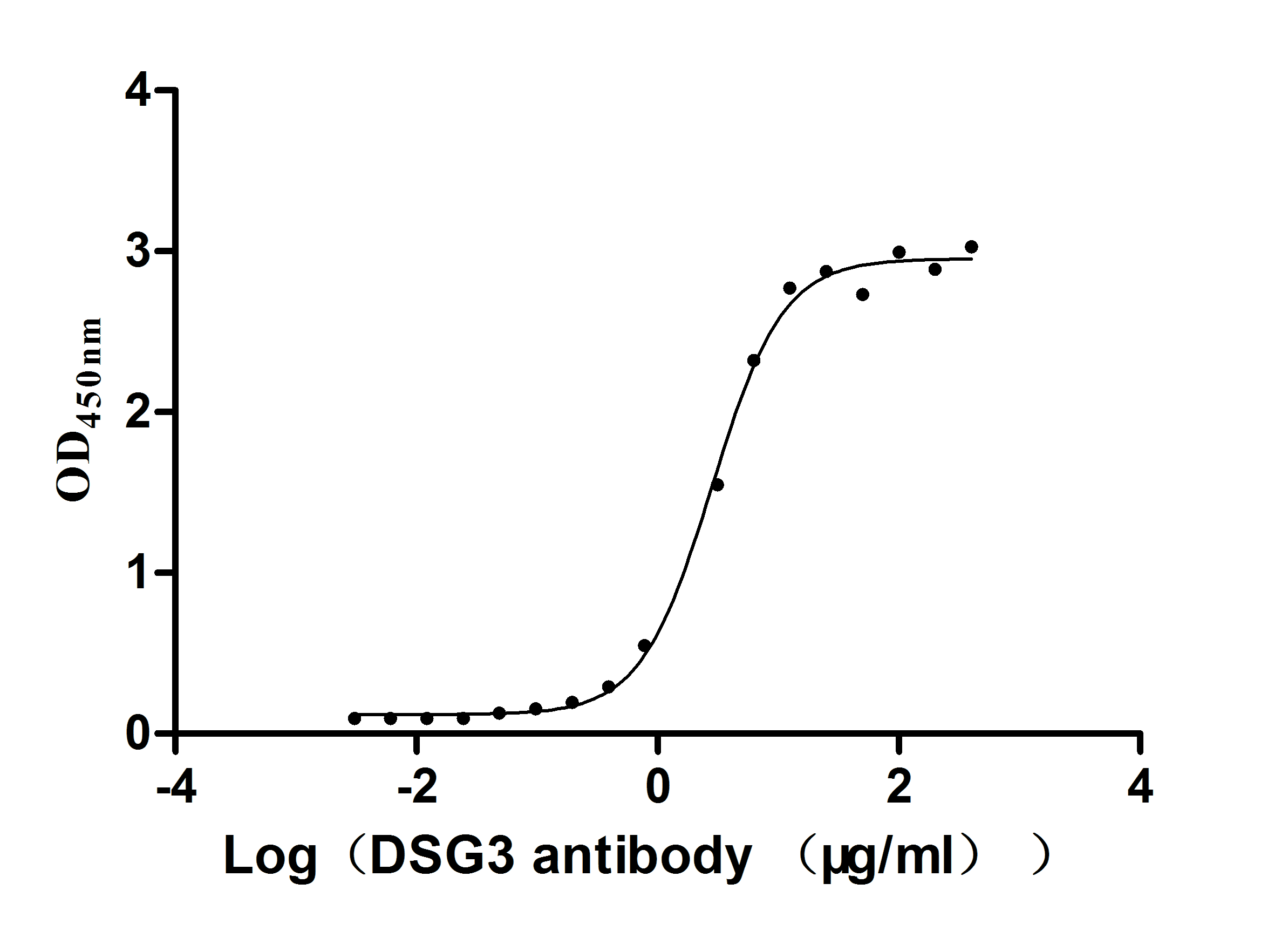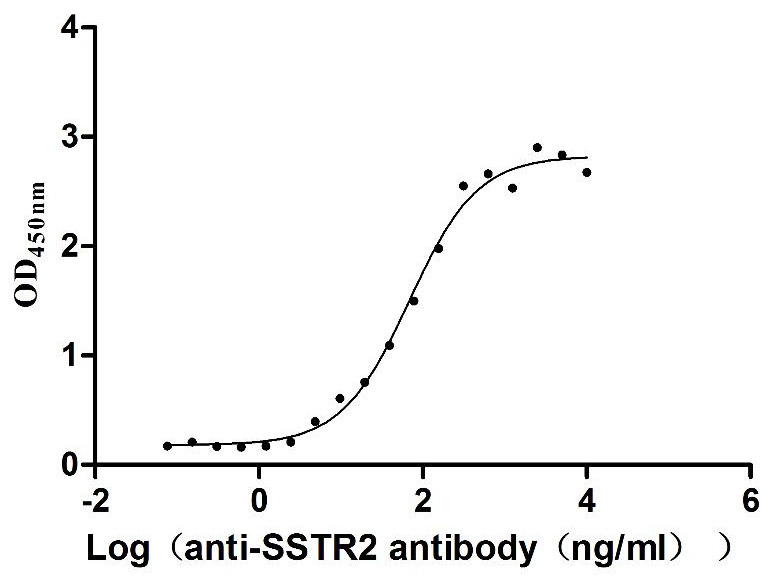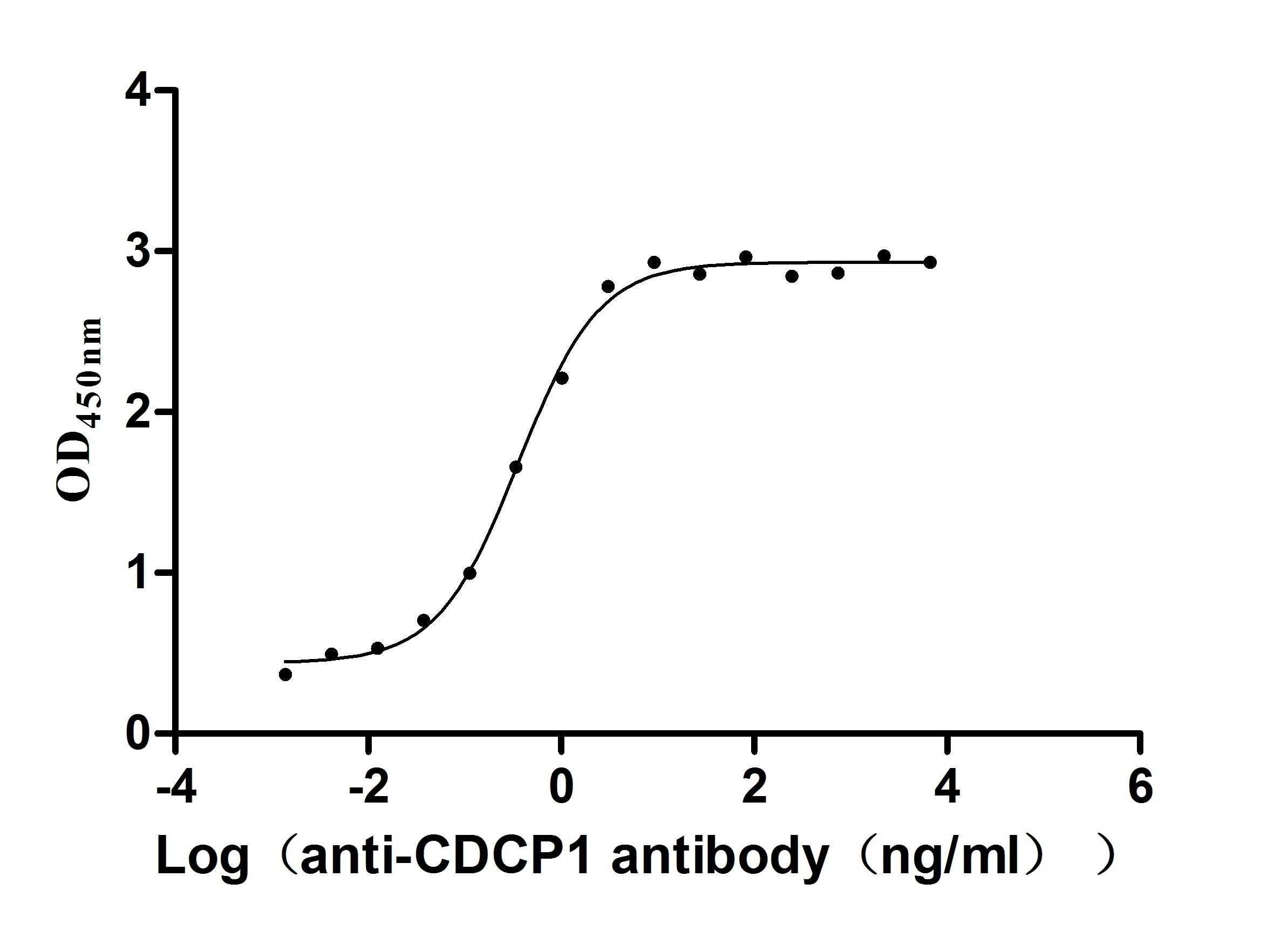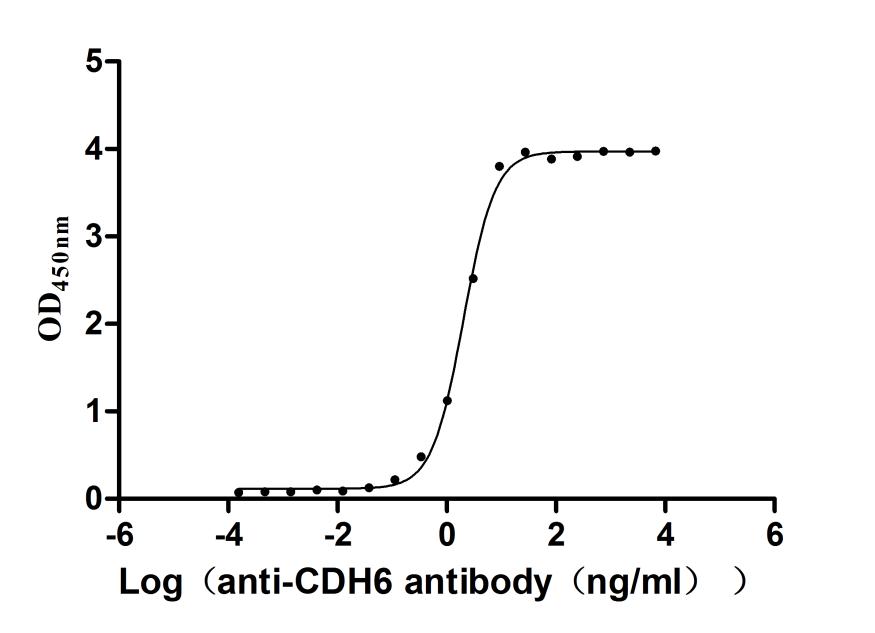Recombinant Human Triosephosphate isomerase (TPI1)
-
货号:CSB-YP024102HU
-
规格:
-
来源:Yeast
-
其他:
-
货号:CSB-EP024102HU
-
规格:
-
来源:E.coli
-
其他:
-
货号:CSB-EP024102HU-B
-
规格:
-
来源:E.coli
-
共轭:Avi-tag Biotinylated
E. coli biotin ligase (BirA) is highly specific in covalently attaching biotin to the 15 amino acid AviTag peptide. This recombinant protein was biotinylated in vivo by AviTag-BirA technology, which method is BriA catalyzes amide linkage between the biotin and the specific lysine of the AviTag.
-
其他:
-
货号:CSB-BP024102HU
-
规格:
-
来源:Baculovirus
-
其他:
-
货号:CSB-MP024102HU
-
规格:
-
来源:Mammalian cell
-
其他:
产品详情
-
纯度:>85% (SDS-PAGE)
-
基因名:TPI1
-
Uniprot No.:
-
别名:TPI1; TPI; Triosephosphate isomerase; TIM; EC 5.3.1.1; Methylglyoxal synthase; EC 4.2.3.3; Triose-phosphate isomerase
-
种属:Homo sapiens (Human)
-
蛋白长度:Full Length of Mature Protein
-
表达区域:2-249aa
-
氨基酸序列APSRKFFVGGNWKMNGRKQSLGELIGTLNAAKVPADTEVVCAPPTAYIDFARQKLDPKIAVAAQNCYKVTNGAFTGEISPGMIKDCGATWVVLGHSERRHVFGESDELIGQKVAHALAEGLGVIACIGEKLDEREAGITEKVVFEQTKVIADNVKDWSKVVLAYEPVWAIGTGKTATPQQAQEVHEKLRGWLKSNVSDAVAQSTRIIYGGSVTGATCKELASQPDVDGFLVGGASLKPEFVDIINAKQ
-
蛋白标签:Tag type will be determined during the manufacturing process.
The tag type will be determined during production process. If you have specified tag type, please tell us and we will develop the specified tag preferentially. -
产品提供形式:Lyophilized powder
Note: We will preferentially ship the format that we have in stock, however, if you have any special requirement for the format, please remark your requirement when placing the order, we will prepare according to your demand. -
复溶:We recommend that this vial be briefly centrifuged prior to opening to bring the contents to the bottom. Please reconstitute protein in deionized sterile water to a concentration of 0.1-1.0 mg/mL.We recommend to add 5-50% of glycerol (final concentration) and aliquot for long-term storage at -20℃/-80℃. Our default final concentration of glycerol is 50%. Customers could use it as reference.
-
储存条件:Store at -20°C/-80°C upon receipt, aliquoting is necessary for mutiple use. Avoid repeated freeze-thaw cycles.
-
保质期:The shelf life is related to many factors, storage state, buffer ingredients, storage temperature and the stability of the protein itself.
Generally, the shelf life of liquid form is 6 months at -20°C/-80°C. The shelf life of lyophilized form is 12 months at -20°C/-80°C. -
货期:Delivery time may differ from different purchasing way or location, please kindly consult your local distributors for specific delivery time.Note: All of our proteins are default shipped with normal blue ice packs, if you request to ship with dry ice, please communicate with us in advance and extra fees will be charged.
-
注意事项:Repeated freezing and thawing is not recommended. Store working aliquots at 4°C for up to one week.
-
Datasheet :Please contact us to get it.
相关产品
靶点详情
-
功能:Triosephosphate isomerase is an extremely efficient metabolic enzyme that catalyzes the interconversion between dihydroxyacetone phosphate (DHAP) and D-glyceraldehyde-3-phosphate (G3P) in glycolysis and gluconeogenesis.; It is also responsible for the non-negligible production of methylglyoxal a reactive cytotoxic side-product that modifies and can alter proteins, DNA and lipids.
-
基因功能参考文献:
- Disease-associated variants change well-conserved residues in the protein's sequence and affect protein stability. PMID: 28341520
- A guide to the effects of a large portion of the residues of triosephosphate isomerase on catalysis, stability, druggability, and human disease has been presented. (Review) PMID: 28378917
- Results revealed that TPI expression might be considered as a novel prognostic factor to evaluate gastric cancer patients' survival PMID: 28489783
- TPI1 functions as a tumor suppressor in hepatocellular carcinoma and might serve as a potential therapeutic target for the treatment of HCC PMID: 27908734
- our findings are the first to identify, to our knowledge, a functional synaptic defect in TPI deficiency derived from molecular changes in the TPI dimer interface. PMID: 27031109
- Polyvinylpyrrolidone stabilised silver nanoparticles (60 nM; 2-6 nm diameter) selectively inhibited PfTIM with a 7-fold decrease in enzyme catalytic efficiency (K(cat)/K(m)) over hTIM. PMID: 26353595
- results suggest amyloid-beta oligomers induce neuronal death by triggering methylglyoxal(MG) production; increased release of MG is a direct consequence of triosephosphate isomerase nitrotyrosination due to amyloid-beta peptide action at the 2 tyrosines associated with the catalytic center PMID: 24614897
- TPI-PEP co-crystal structure, demonstrating that PEP directly binds into the catalytic pocket of TPI. PMID: 24598263
- E104D mutant is highly susceptible to proteolysis, which in all likelihood contributes to the pathogenesis of enzymopathy. In addition, the proteolysis data on wild type HsTIM illustrate an asymmetric conduct of the two monomers. PMID: 24056040
- Data suggest that exchange reactions during gluconeogenesis catalyzed by triose-phosphate isomerase and transaldolase do not differ between subjects with type 2 diabetes and control subjects under fasting or hyperglycemic conditions. PMID: 23736541
- we review the relationship between modified TPI and Alzheimer disease (AD), highlighting the relevance of this protein in AD pathology PMID: 23233058
- study found promoter SNPs of CKB and TPI1 were weakly associated with schizophrenia;in addition, IFNG polymorphisms were associated with schizophrenia; results suggest that IFNG and proteins affected by IFNG may play a role in the pathogenesis of schizophrenia PMID: 22623148
- [Review] The activity of glycolytic enzyme TPI reveals a mechanistic link between energy metabolism and age-related proteostatic dysfunction which can suppress generation of altered proteins that characterize the aged phenotype in cells and tissues. PMID: 21651995
- A patient with triosephosphate isomerase-deficiency was found to be homozygous for a Val231Met mutation. PMID: 21215915
- A proteomic approach for identification and localization of the pericellular components of chondrocytes. PMID: 21698479
- structural changes rather than abnormal catalysis may play an important role in the clinical manifestations of TPI deficiency; the postulated high aggregation ability of the unstable Glu104Asp mutant would lead to more serious symptoms PMID: 20546019
- TPI1 were up-regulated with the malignancy of prostate cancer cell lines and have their potential as serum biomarkers for indicating the developmental stage of prostate cancer. PMID: 20233700
- of two previously undescribed mutations: c.722 T>C (Phe240Ser) and c.28 insG; each of the two unrelated patients showed the new mutation in compound heterozygosity with the most common variant Glu104Asp, resulting in a very severe clinical pattern. PMID: 20374271
- the dimerization behavior of TPI is influenced by the particular mutations investigated, and by the use of a potential alternative translation initiation site in the TPI gene PMID: 17183658
- kinetic, thermodynamic, structural and ultrastructural data for characterization of mutant isomerase structures and for the TPI-related metabolic processes in normal and deficient cells PMID: 12023819
- Minor structural changes in a mutated human melanoma antigen (TPI) correspond to dramatically enhanced stimulation of a CD4+ tumor-infiltrating lymphocyte line. PMID: 12051920
- A patient with triosephosphate isomerase (TPI) deficiency exhibited worsening of abnormal involuntary movements of the dystonic type and developed psychiatric symptoms while on selegiline. PMID: 14743370
- IgG-type anti-TPI autoantibodies were detected in 24.7% of the serum samples and 24.1% of the synovial fluid samples from the patients with osteoarthritis PMID: 15146421
- anti-TPI antibodies are closely associated with neuropsychiatric lupus PMID: 15358119
- We found that a low TPI activity in the mutant cells (lower than predicted from the protein level and specific activity of the purified recombinant enzyme) is coupled with an increase in the activities of glycolytic kinases PMID: 16086671
- Mutations causing TPI deficiency in humans are characterized by progressive neurological dysfunction, neurodegeneration, and early death. PMID: 17008404
- TPI and GAPDH may be candidate Ags for an autoimmune response to neurons and axons in multiple sclerosis. PMID: 17015754
- anti-TPI form immune complexes in CSF and contribute to the pathogenesis of neuropsychiatric lupus by activating the complement system PMID: 17064784
- Triosephosphate isomerase (TPI), a glycolytic pathway enzyme, was identified as a downregulated protein in SGC7901/VCR cells PMID: 18309519
- TPI variants occur less frequent than expected and inactive alleles are not enriched in German centenarians PMID: 18510744
- human triosephosphate isomerase mutation E104D is related to alterations of a conserved water network at the dimer interface PMID: 18562316
- Population samples from Angola, Mozambique and S. Tome e Principe has 3 haplotypes of the TPI gene promoter variants -5A-8G-24T,-5G-8G-24T and -5G-8A-24T in malaria-infected individuals. PMID: 18792062
- This protein has been found differentially expressed in the Wernicke's Area from patients with schizophrenia. PMID: 19405953
显示更多
收起更多
-
相关疾病:Triosephosphate isomerase deficiency (TPID)
-
亚细胞定位:Cytoplasm.
-
蛋白家族:Triosephosphate isomerase family
-
数据库链接:
HGNC: 12009
OMIM: 190450
KEGG: hsa:7167
STRING: 9606.ENSP00000229270
UniGene: Hs.524219
Most popular with customers
-
Recombinant Mouse Desmoglein-3 (Dsg3), partial (Active)
Express system: Mammalian cell
Species: Mus musculus (Mouse)
-
Recombinant Human Somatostatin receptor type 2 (SSTR2)-VLPs (Active)
Express system: Mammalian cell
Species: Homo sapiens (Human)
-
Recombinant Human Desmoglein-3 (DSG3), partial (Active)
Express system: Baculovirus
Species: Homo sapiens (Human)
-
Recombinant Human CUB domain-containing protein 1 (CDCP1), partial (Active)
Express system: Mammalian cell
Species: Homo sapiens (Human)
-
Recombinant Mouse Cadherin-6(Cdh6),partial (Active)
Express system: Mammalian cell
Species: Mus musculus (Mouse)

















